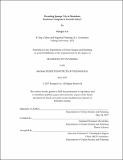Decoding Sponge City in Shenzhen : resilience program or growth policy?
Author(s)
Cai, Hongru, M.C.P. Massachusetts Institute of Technology
DownloadFull printable version (9.648Mb)
Other Contributors
Massachusetts Institute of Technology. Department of Urban Studies and Planning.
Advisor
David Hsu.
Terms of use
Metadata
Show full item recordAbstract
Unprecedented urbanization in China, combined with the increase of extreme weather events globally, has led to greater vulnerability of Chinese cities to urban water management issues including non-point source pollution, shortage of fresh water and urban floodings. In response to these problems, a national policy named "Sponge City" was first introduced in early 2014 to form a comprehensive alternative. Since then, two major views of its conceptualization have defined "Sponge City" as (1) a distributed resilience program modeled after Low Impact Development (LID) and Green Infrastructure (GI), and (2) a growth policy justifying the new investment in urban construction sector and the experimental field of financial innovation to involve private investment such as Public-Private Partnerships (PPP). However, a central contradiction has been widely observed in practice as the environmental and economic agendas of "Sponge City" are not always compatible with each other. This thesis examines the phenomenon where local governments, in the face of such dilemmas, have tended to skew "Sponge City" towards pro-growth policies by branding "Sponge New Districts" in urban outskirts, and asks why and how local governments use "Sponge New District" as a potential resolution. This thesis studies the case of Guangming New District in Shenzhen, Guangdong Province and argues two rationales exist behind this strategy. First, the development of such "Sponge New Districts" provides local government with more opportunities for private investors to profit from basic urban infrastructure projects such as roads and amenities. Second, such development justifies the direct intervention of the government in financing and construction by aligning Sponge New Districts with the local expansion agenda. Nonetheless, these "Sponge New Districts" divert the original environmental ideology of Sponge City and suggest that a fundamental gap exists between an idealized resilience program and the execution of pro-growth agendas at the local governmental level in contemporary China.
Description
Thesis: M.C.P., Massachusetts Institute of Technology, Department of Urban Studies and Planning, 2017. This electronic version was submitted by the student author. The certified thesis is available in the Institute Archives and Special Collections. Cataloged from student-submitted PDF version of thesis. Includes bibliographical references (pages 66-69).
Date issued
2017Department
Massachusetts Institute of Technology. Department of Urban Studies and PlanningPublisher
Massachusetts Institute of Technology
Keywords
Urban Studies and Planning.